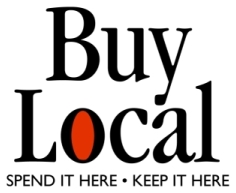Recycling and Buying Local
Recycling used to be kind of a fringe activity reserved for "crazy" people roaming highway ditches seeking aluminum cans. In contrast, buying local used to be something everyone did. In many cases there were few alternatives for getting what you needed.
Today this has changed. Recycling is ubiquitous, but few of us truly "buy local". There are some important lessons that BUY LOCAL advocates can learn from the recycling movement, lessons that have strong land use implications.
Two decades ago, I did not know many people who recycled. We collected cans in third grade and used the money to have an ice-cream party at the end of the year. My dad volunteered his truck to haul cans, which made me feel really cool. When I got married, my thrifty wife got on my case to recycle. I'd throw my pop can in the garbage. She'd fish it out.
My argument for not recycling at the time was that it just didn't make sense. I pointed out to my wife that, in order to recycle, we had to essentially live in a world of garbage. My garage became a transfer station of used cans, bottles and newspapers waiting to accumulate enough mass to justify the trip the recycler. When we did accumulate enough, I had to load this leaky trash into my nice car, take time off from work to drive it to Zeke's who practically charged me to take it.
Just throw the can in the garbage and save all the hassle. I love the environment, but you can't convince me I was saving it by recycling.
Today (yes, December 16) my wife and I celebrate our 14th wedding anniversary. A lot has changed in the near decade and a half since we were married, including the fact that we now jointly recycle. Is this because I am somehow a "new man", borne again in the religion of environmentalism? Or is it more simple than that?
Recycling always made sense to me. Why would we put something in a landfill when we can reuse it. Duh. This is a no-brainer. What I always resisted is how difficult it was to do the common-sense thing. What has changed now to make me a recycler is how easy and convenient it is.
Today, I throw the paper in the paper bin. Cans in the can bin. Bottles in the bottle bin. Once a week we take out the trash and, what do you know, there goes the recycling too. Easy. Easy. Easy. I'm the same man I was fourteen years ago in this regard, only now I recycle.
When we are out working in communities and are talking about economic development, someone inevitably stands up and extols everyone in the room to "do their duty" and BUY LOCAL. The thought goes: If we just all bought local and supported each other, we'd be so much better off economically. Applause all around.
Then the meeting ends, everyone leaves, gets in their car, drives to Wal-Mart, McDonalds or Super America and talks about the great meeting. The purist in the group curses those that don't practice what they preach, but everyone else understands that BUY LOCAL is great in theory, but very difficult in practice.
Kind of like recycling used to be.
We get a lot of pressure to support efforts to fight against Wal-Mart and other "big box" retailers. We always resist and point out to people that Wal-Mart and other big boxes are the symptom, not the disease. The disease is bad land use practices. Specifically, those land use practices induced by inefficient transportation and infrastructure subsidies.
Big box retailers today are simply responding to the land use pattern we have created. When we force EVERY trip to be an auto-based trip, we make it uncompetitive to be a local business. We are also providing massive advantages to those businesses that can draw people by car from a large area. Today, BUY LOCAL is something crazy people do. Why pay more and have more hassle when you can simply drive to Wal-Mart and get everything you need?
The key to economic development in Strong Towns is adopting a land use pattern that strengthens local businesses, local investments and local competitiveness. As our small towns continue to devolve in a highway-oriented suburban fashion, not only do the local businesses become less convenient and thus less competitive, the competition on the periphery of town gains all the advantage.
A new model of development is needed if we want to support local small business, create jobs and grow Strong Towns. Our land use pattern needs to make BUY LOCAL as easy as recycling if we are truly serious about the effort.
Notes
Some related reading from the Strong Towns Blog includes:
- Understanding Downtown, which takes issue with our current approach of building "cute" downtowns and instead talks about what it takes to build financially viable downtowns.
- The Reality of Brainerd's Parkway, which points out the implications of an auto-first development strategy.
- Rethinking Economic Development, which contrasts the current approach to economic development used by most cities with a Strong Towns approach modeled on the ideas of Jane Jacobs.
You can continue this Strong Towns conversation by posting a comment or by joining us on Facebook. You can also follow Strong Towns on Twitter. We appreciate all of the support.
